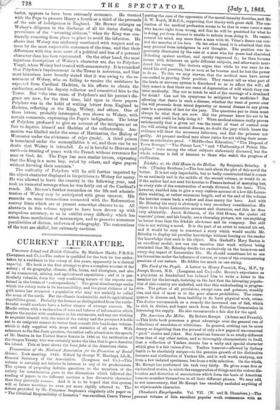Transactions of the National Association for the Promotion of Social
Science. York meeting. 1846. Edited by George W. Hastings, LL.B., General Secretary of the Association. (Longman and Co.)—This volume is certainly not inferior in interest to any of its predecessors. The system of proposing definite questions to the members of the society for consideration gave to the discussions which followed the reading of papers in the different sections a less discursive character than they generally assume. And it is to be hoped that this system will at future meetings be even yet more rigidly adhered to. The debate provoked by Mr. Fitzjames Stephens's singularly able paper on "The Criminal Responsibility of Lunatics" was excellent, Canon Trevor
putting the case of the opponents of the moral-insanity doctrine, and Mr. S. W. North, M.R.C.S., supporting that theory with great skill—The con- tention of the medical profession seems to be that in some cases a man who knows right from wrong, and that he will be punished for what he is doing, yet from disease is unable to refrain from doing it. He cannot control his mind, any more than a man with St. Vitus's dance can con- trol the muscles of his face. On the other hand, it is admitted that this may proceed from indulgence in evil thoughts. The position was in- geniously illustrated by the case of a man who for years had cherished ill-feeling against another, and openly expressed it; he then became insane with delusions on quite different subjects, and afterwards mur- dered his enemy. The doctors argue that while he was sane he re- sisted his evil passions, but as soon as he became mad he lost the power to do so. To this we may answer, that the medical men have never succeeded in proving their position. They cannot tell us what part of the brain or nervous system is disordered 130 as to affect the will; all they assert is that there are cases of depravation of will which they can treat medically. May not as much be said of the cravings of a drunkard for drink? Can not his symptoms be mitigated by medicine ? But allowing that there is each a disease, whether the want of power over the will proceeds from moral depravity or mental disease in any given case is a question of fact for the jury. The questions put to them must always be what they are now. Did the prisoner know his act to be wrong, and could he help doing it? When medical science really proves satisfactorily that a given act was the result of want of control over the will arising from mental disease, no doubt the jury which hears the evidence will draw the necessary inference, and find the prisoner not guilty. At present medical men abuse juries for not taking their asser- tions as conclusive proof. "Middle-class Education," "The Disposal of Town Sewage," "The Patent Law," "and "Uniformity. of Prison Dis- cipline " were among the other subjects elaborately discussed, but the whole volume is full of interest to those who watch the progress of civilization.






























 Previous page
Previous page